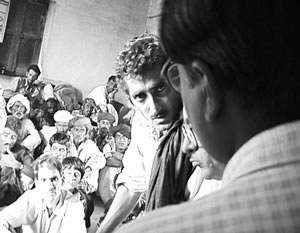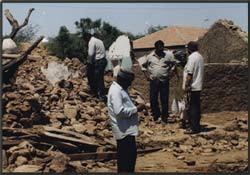 AFTERSHOCKS:
AFTERSHOCKS:
The Rough Guide to Democracy
Directors’ statement:
In a world being increasingly shaped by the corporate-nation state
and its hydra-heads (WTO/ IMF/World Bank/ADB), the “marginal” citizen
is in danger of becoming totally “irrelevant”. His voice
has no space in mainstream newspapers and television, which is dominated
by millionaire-maker shows, reality TV voyeurism, revenue-driven newscasts
and sterilized fiction. These “marginal” voices and their
universes fascinate me, as my own universe is inextricably intertwined
with it.
Aftershocks is a film that happened almost by accident. While working as a relief volunteer in the earthquake-affected zone, I stumbled across the story. It horrified me enough to overcome my own reluctance about being a part of “disaster tourism”. To many, it seemed like a non-story from the very beginning- 2 tiny villages destroyed by the quake versus a government controlled corporate giant (GMDC - the mining company) out to profit from the quake - not a single adverse report appeared in TV or print till press previews for Aftershocks were held! Even then, the financial dailies and television news channels blacked out the story completely.
Aftershocks is a journey through the labyrinthine universe of Democracy,
as it exists in its lowest unit level - the Indian village.
Awards
1. Robert Flaherty prize, Pennsylvania film
festival (USA;2002)
2. Le Prix de la Presse politique (Best documentary film), 16th Fribourg International
film festival (Switzerland; 2002)
3. John Michaels memorial award and Bronze for best documentary feature, Big
Muddy film fest (USA; 2002)
4. Best Documentary ( feature-length), Big miniDV film festival (USA; 2002),
5. Earthvision Award, Earthvision filmfest 2003 (Japan)
6. Special Jury award, Ecocinema 2002 ( Greece)
7/8. Jury citation/mention at Black International Cinema fest (2002; Germany)
and at Earthvision 2002 (USA)
9. Certificato di Merito Bronze, 12th Prix Leonardo (2003; Italy)
10. Best Documentary, Jeevika (India; 2004)
Review blurbs :
“
It is an exposť…it shocks, it jolts…” – Indian
Express
“
The film delves into the complexities of caste…” - Hindustan
Times
“
Aftershocks captures brilliantly the ‘business as usual’ philosophy
of our elites – The Hindu
"
The image that will not go away as one watches Rakesh Sharma’s
film is of vultures. Kind, suave vultures." - Mid-Day
"
Despite the grave subject, the film manages to inject a lot of humour" -
infochange India
"
Aftershocks appeals because of its subtlety. It draws the viewer through
an absorbing unravelling of the narrative" - Newsline
“
The quake was used to harness corporate goals…Aftershocks captures
the proceedings”- The Independent(UK)
"
The film shows with painful clarity how easily a powerful corporation
can use hollow promises" - DOX
About the film
Aftershocks is about the transformation of the Welfare State into an ally of the Corporation. It examines the acquisition/ displacement of two quake-affected villages for lignite mining and power generation. It probes the microcosm in the nature of a study "from below" of globalisation of Economy and corporatisation of Democracy
Details :
On January 26, 2001, Kutch (Gujarat, India) was devastated by a massive earthquake. Over 20,000 people died and tens of thousands of homes were destroyed. Bhuj, Anjar, Rapar and Bhachau, the most severely affected areas, received attention from many international relief agencies, national and international media, even personal visits from Prime Minister Vajpayee and Citizen Clinton.
This film is set in Julrai and Umarsar , two villages in Lakhpat,
near the India Pakistan border, close to the Gujarat coast, and
too far away
from Bhuj to be in focus. Umarsar is an upper caste Durbar village,
while Julrai's entire population comprises low class Rabbaris,
semi-nomadic
shepherds, who began to settle down into permanent villages only in
the last couple of hundred years. The two villages have nothing
in common
except that both were almost totally destroyed during the quake and
both are sitting on top of lignite reserves. The Government-controlled
Gujarat
Mineral Development Corporation has a monopoly over any mining activity
in the region. GMDC is likely to be privatised completely over the
next few years; 26% of its shares were sold to corporates, financial
institutions
and investors in 1997-98.
This film traces the story of GMDC's attempts to acquire the two
villages. Eight weeks after the quake, on March 26, 2001, our
camera accidentally
bumps into the GMDC acquisition survey team in Umarasar. Over the
next few months, the film moves in and out of Julrai, Umarsar
and the GMDC's
existing lignite mines and probes the processes of displacement and
resettlement.
Did GMDC succeed in exploiting the earthquake as a God-sent opportunity
to hasten the acquisition? How did the obviously vulnerable quake-affected
people of Julrai and Umarsar deal with it? What was the role of
the state government machinery, entrusted with the welfare of
its calamity
affected
people? How have the existing mines and the power plant affected
the lives of the people living nearby? Have the Executive, the
Judiciary and the Legislative taken note of this human impact
before they paved
the way for the new mines and the new power plant?
The film is a hitchiker's journey through the labyrinthine universe of Democracy, as it exists in its lowest unit level - the Indian village.

Links
> Video Clips
on
http://tv.oneworld.net/tapestry?story=323&window=full
> An article about Aftershocks in 'The Hindu'
www.hinduonnet.com.
> An article
about Aftershocks at www.infochangeindia.org
www.infochangeindia.org.